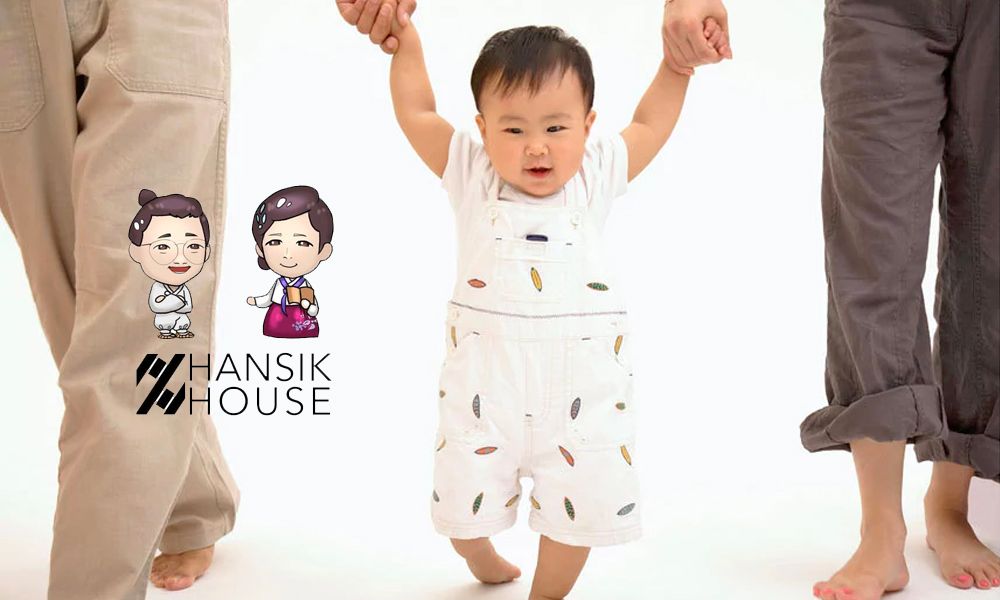
The last time I visited Singapore about 4 or 5 years ago, I saw the most damning thing. The government had sponsored a series of national advertisements encouraging couple to procreate. They wanted their citizens to shack up and make lots and lots of babies. These were state-funded messages strapped onto billboards and popping up in mainstream commercials.
I soon learned that this wasn’t so much an isolated incident. Several countries in the region such as Taiwan, Hong Kong, Japan, and as featured in the title - Korea - are reporting declining rates of childbirth and “at-risk” populations. If things don’t change soon for these countries, there will be no-one left in a few hundred years.
Birth rates in asian countries have nose-dived in the last few decades. Korea has recently reached a new low, now officially becoming the fastest aging developed country. The average rate of birth is 1.25 children per woman, essentially meaning a drastic net-negative per every married couple. As of August 2017, less than 360,000 births had taken place in the previous 365 days, shattering the all-time-low record of 400,000.
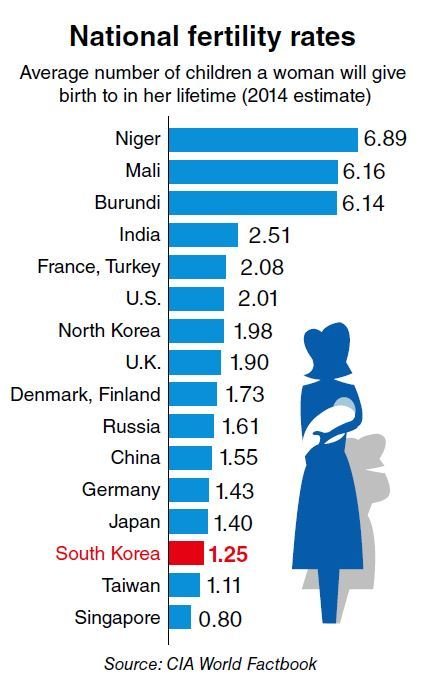
The newly elected president Jae-In Moon called it a “national crisis” that would require comprehensive labor, pension, and housing reform. A falling youth population doesn’t just mean less pacifier sales. The country is now facing severe threats to its social programs, particularly those that support the rapidly expanding elderly population, and domestic industry is disappearing as I write this. A thriving young population is desperately needed to balance out the needed facets of society and Korea is most at-risk.
But why is this happening? Everyone knows that Korean babies are the cutest bundles of yellowy goodness, so why such adversity to making more? It seems Korean society is in a perfect storm that is tearing the nuclear family apart. We’re in a unique moment of history where several factors contribute to this suppression of pregnancy rates and in this post I’ll be going through a few of them.
1- Isolated Living
If you’ve ever been to some of the countries of lowest contemporary birth, you’ll notice one physical aspect immediately - high density living. Japan, Hong Kong, Singapore, Taiwan, and Korea have all converted from home estate living with whole families to zillions of high-rises that barely fit a bedroom or two. Sky-rocketing real estate has dissected once large family complexes into tiny apartments. Just like an animal in a tiny cage, the physical constraints of a home will dissuade the body or family from growing any bigger.

Source: YTIMG
2- Cost of Living
On top of confined spaces, the general cost of living in Korea is astronomical compared to a few decades ago. Housing in particular are almost impossible to access for a young professional, even with a well-paying corporate job. If young people almost unanimously live at home during their early career due to high costs, how could they ever support a family household on their own?
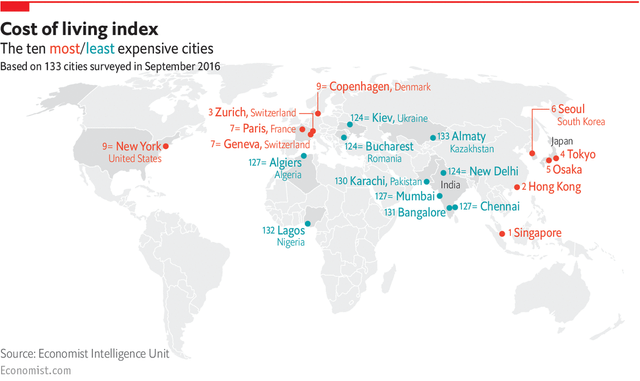
Source: The Economist
3- Women in the Workplace
We saw a correlated drop in birthrates in the US too when women began entering all disciplines of the workplace. Although sexist practices are abundant in Korea, women have nonetheless taken the workplace by storm and the population of independent female professionals is at an all-time high. Sadly, this means less women willing to have children at a young age or at all.
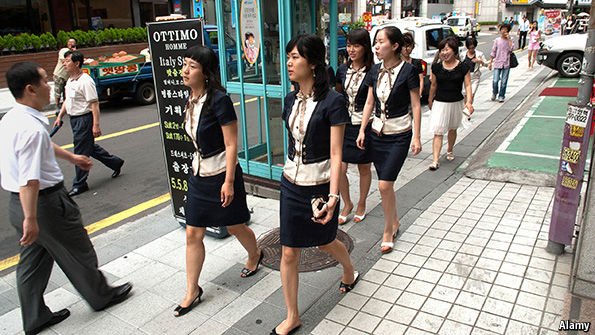
Source: The Economist
4- Plummeting Satisfaction in Life
Life for a youth in Korea has been dubbed “Hell” by the majority. Younger individuals are increasingly barred from higher levels of education and esteemed jobs due to rising competition. Having a child just doesn’t seem ‘worth it’ when lives for parents and children are becoming more and more agonizing at a national scale.
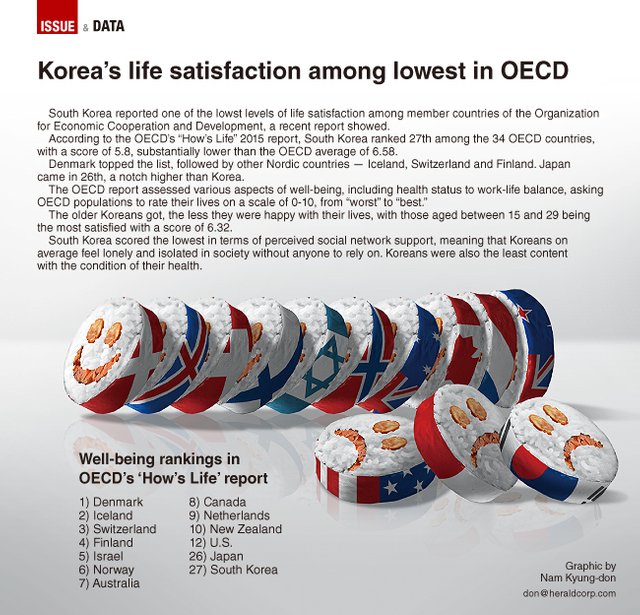
Source:The Korea Herald
So what do we do?
This seems a tangled web of hopelessness that is almost impossible to tackle from any single angle. People just don’t want to have kids and the reasons are so many, in fact much more than what I’ve noted on today. So many that it has gone beyond rationale and it has become the given impulse of young couple. Maybe 1 child, probably not any more than that.
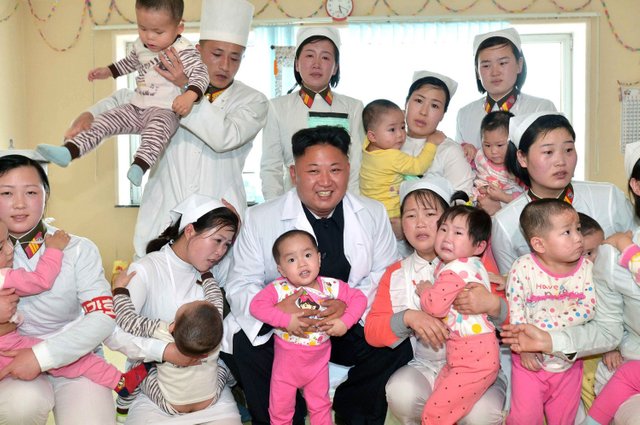
Source: Time
Figuring this issue out is in fact the golden ticket to getting Koreans to a better environment. I’d love to hear your thoughts and I’ll most likely revisit this issue and sub-sections of this issue in future posts. For now though, all I can do is share a bit of optimist energy and encourage the joy of new life.
So as a New Year’s Resolution, make a baby! Or better yet, twins or triplets?

People in Korea do not have time for children
Downvoting a post can decrease pending rewards and make it less visible. Common reasons:
Submit
Too much time dedicated to work/drinking ;)
Downvoting a post can decrease pending rewards and make it less visible. Common reasons:
Submit
And shopping!
Downvoting a post can decrease pending rewards and make it less visible. Common reasons:
Submit
Yup. Mostly work and drinking only.
Downvoting a post can decrease pending rewards and make it less visible. Common reasons:
Submit
3 countries that have the lowest birth rate (S Kor, Singapore, Taiwan) are the 3/4 ones that achieved the industrialization at an extreme proliferate in 1980s. They were called the four dragons of Asia. The dragons have the wealth now but still dont know what the real love is. l o v e ~
Downvoting a post can decrease pending rewards and make it less visible. Common reasons:
Submit
No time for sexy time when you're a dragon...
Downvoting a post can decrease pending rewards and make it less visible. Common reasons:
Submit
😐.... !
Downvoting a post can decrease pending rewards and make it less visible. Common reasons:
Submit
Wow. Thanks for posting. I did not know this about Korea.
Downvoting a post can decrease pending rewards and make it less visible. Common reasons:
Submit
Thanks for reading @mrmystery!
Downvoting a post can decrease pending rewards and make it less visible. Common reasons:
Submit
Didn’t know that. Crazy! Kind of makes sense at the same time
Downvoting a post can decrease pending rewards and make it less visible. Common reasons:
Submit
You should feel blessed to have me around. I'm like a rare Korean panda.
Downvoting a post can decrease pending rewards and make it less visible. Common reasons:
Submit
What I see is that there is a tendency in more developed countries to have fewer children, and the same in the opposite direction. How is it possible that families in Niger, Mali or Burundi have so many children? considering the situation of poverty in which they find themselves. That is the same as Emmanuel Macron said a few months ago.
Even the North Koreans are reproducing faster than the South Koreans. although I noticed that he referred to the Koreans and then placed a picture of Kim Jong-Un, so I do not know what his position is regarding this.
It may just be a reproductive cycle, at some time in the past they played too fast and now it's the other way round; South Korea, for example, has twice as many inhabitants as its northern neighbor.
Downvoting a post can decrease pending rewards and make it less visible. Common reasons:
Submit
영어닷..하면서 번역기 돌려서 읽어봤어요.
확실히 출산율이 저조하면서 인구가 감소하는 현상이 일어나고 있죠.
문재인정부가 계속해서 대안을 내놓고 있더라고요. 점차 방향은 좋아지겠지만 많은 분들의 생각이 전환되어야 하는 점도 필요한 것 같아요.
Downvoting a post can decrease pending rewards and make it less visible. Common reasons:
Submit
I don't think lower birth rate is bad news.
The Earth is currently overpopulated, and having less population doesn't mean you'll go extinct !
Downvoting a post can decrease pending rewards and make it less visible. Common reasons:
Submit
Since joining sndbox I've watched some YouTube clips of life in S. Korea, and they all reflect what you report, except:
Life for a youth in Korea has been dubbed “Hell” by the majority. That is a shocker.
In some respects, as you probably know, the situation is similar here in Germany it terms of the ageing population. Here we have other problems which you don't. As some here say, culturally in 50 years Japan and South Korea will still be Japan and Korea. European culture will be so diluted that for practical purposes it will no longer exist.
This will not change, and it isn't wise to speak of it.
In terms of policy for S. Korea, I could imagine small communities with generously subsidized homes for people with a child who have a second child on the way. Perhaps one of the parents could be offered a part-time job in the community (schools, kindergarten, social services, etc.) as a compromise between stay-at-home-parent, and both parents working.
It is a huge problem.
Downvoting a post can decrease pending rewards and make it less visible. Common reasons:
Submit
이미.... 투잡도 심심찮게 보이고.... 돈을 벌기위해 맞벌이도 불사하는것을 보면.... 당분간은 어렵지 않을까 합니다.. 해결이.... 국가정책상으로 많이 뒷받침이 되어야 할듯 한데... 아직은 한참 멀었다고 보거든요.... 미래보다도 지금당장 먹고 사는게 힘든것도 한 몫을 한다고 봅니다.
Downvoting a post can decrease pending rewards and make it less visible. Common reasons:
Submit